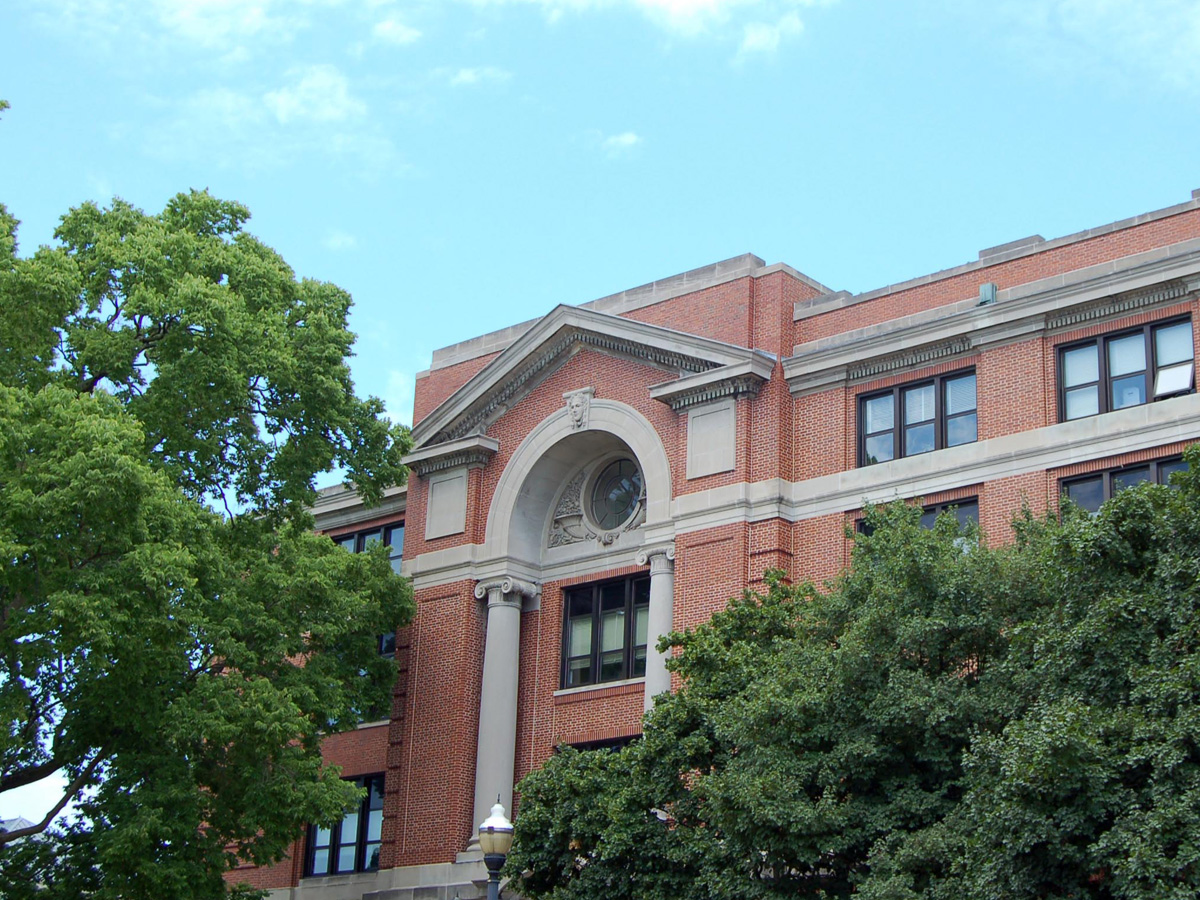
Staff Spotlights
The college would like to thank our staff for their hard work and dedication to their work, departments and their team. You are the cog that not only keeps the college running but works to inspire, grow, and strive for excellence. Each month, the Insider will highlight nominated staff members. Please help us celebrate our staff by submitting a nomination.
Shaun Gunter, Educational Studies, registration and records specialist
Can you describe what you do as a registration and records specialist?
I'm primarily the department scheduler. My unit has 14 programs that I scheduled. I'm involved in the administration of the courses, not just in scheduling, but at the catalog level as well.
But really, it's making sure that all of our courses are on the schedule each semester, that they’re in the right place at the right time for the students and that the staff and faculties’ needs are met as well.
I really enjoy doing that work. I'm also involved in the data analytics group, and I've been putting courses through for new certificates. So, I do provide a lot of admin support to our associate chair.
What do you enjoy most about working with EHE?
I think education is just really, really important. I was a high school dropout, actually, and I had a different career. I played professionally, doing heavy metal for a while, and I wasn't sure I was going to be able to go to college at all when I made that decision.
At this point, I have a master's degree, and I'm coordinating the educational studies department for Ohio State. It's an honor for me to just be involved with the largest land- grant university in the state. Just being here is cool, I got to overcome a lot of my own challenges.
The best part about the job itself is the people of course. I really like my co-workers and being in an environment with scholars, teachers and counselors, because those are all individuals who are looking to help society. That's why they do the work that they do.
I love to be able to support that, and although I have a master's degree, I feel that my colleagues in my department are much more talented than I am. So, it's good to get to be a cheerleader for them and at least play a role. I get to support these really, really committed and talented people, and that's for sure the best part.
What inspires you daily?
I take a lot of influence from Eastern philosophy because that's my background academically. I have a Master of Humanity degree, so I take a lot of world views from Eastern thought systems.
But the really cool thing is seeing other people around me in this department meet these really exemplary benchmarks for the human condition. They're very kind, selfless, patient and compassionate.
I turned to the academic study of these thought systems to try to learn what it meant to be a good person, and I found it so interesting to be in a place where there are other people who have kind of figured it out. That's inspiring to me because it really does speak to the universal nature of the philosophies that I studied.
It's also so comforting to know that people can be fundamentally good without having to go that route, that there are so many paths to being an influential and good person without having to read all the books.
How do you connect with the core values or the mission of the college daily?
With excellence, I try to deliver top-level service to the department as much as I can. I try to do a really good job, and I really care about my work.
It's probably the first job I've had that I really like doing. I've done other things, and I've been skillful at them. But I enjoy what I do here. That is a new experience and just a wonderful thing.
I'm always striving to meet (excellence) when I log on each day. I’m bent on making sure that our mission is accomplished, that all the work gets done, that we have a collegial environment where we can support the college in a larger way, even as a singular department.
Diversity is super important to me, because of my feelings about people. You get to really experience that if you're interacting with people from different backgrounds and cultures and academic interests — Just different majors, difference ages of people, young people to more senior people, older people who are here and just sharing everything about life.
I try to really contribute to (supporting diversity). More than anything, I think I'm reaping the benefits. I hope I'm giving back, too.
What is your proudest moment at EHE?
Probably this (interview). To know that people are reaching out to talk about my personality traits, accolades, achievements and my level of competence behind my back when I'm not around feels really good to know. It lets me know that I'm making a positive impact.
The associate chair (Ann Allen), my boss, does give me that good feedback. She lets me know how she feels about me, and that I'm doing a good job. That is very valuable, but it's also so great to be nominated for something like this because I know that that influence is out there elsewhere.
I also know that she can tell people in the department that if they need help, they can reach out to me and I'll respond. I'll be there to give them a hand. So, I'm really proud of that.
I'm proud of knowing that people believe they can rely on me to help them when they need it. I think that's what we all want in life, you know, is to not feel like we're by ourselves and that there's someone around to support us and not make us feel like a burden for doing so. That's pretty cool.
How are you growing professionally in your position?
I'm really excited about that. Right now, I'm working on two certifications. I'm doing a data analytics certification with Google. I'm part of the college’s data analysis group. We're kind of a group of ad hoc data analysts who are interested in data storytelling.
When our departments or the college is curious about enrollment numbers, or they have an email project and want to reach a certain population, or they need to identify trends on our work and our student outcomes, they can reach out to us and we'll work to put together a dashboard, a report or at least share with them the information they need to make informed decisions.
The second thing I'm working on is my CDCA, which is a certification for addiction counseling. Because Educational Studies teaches counselors and professional counselors, I've been able to be really close to the prevailing literature and the new ways that professionals are trained to help with that need with the opioid crisis.
We have a larger need than ever for people to go into the field who don't necessarily have MBAs. They're not psychiatrists, or they don't have PhDs as psychologists. I've decided to talk with Ohio's board and communicate with the department and figure out how I can be a part of helping that population and that demographic that needs these services.
So, there's some cool stuff going on in educational studies in general with counseling, which I can't talk about in detail at the moment, but I am, in my own time, continuing my education. I just passed my first subject area exam, so I'm on my way to licensure.
My plan is to stay in the college; that will be my primary job. Then I teach in the evenings (Ju-Jitsu). Doing addiction counseling will be my third vocation. When I'm not here on the mats, I'll hopefully be counseling people and helping provide services to the community. If I do well, and I really like it, I hope to pursue higher education in my department with counselor ed and continue to get those credentials. It's one more way to help people, which is something I really like doing.
I'm excited about all of that, and I think data analysis is going to give me an edge in helping us understand what types of medical information we have about that demographic, what the trends look like. Maybe that can inform my counseling approaches. I don't know, but I'm going to find a way to put all of those things together.
Do you have any hobbies or interests you'd like to share?
I was a professional heavy metal musician. I'm a martial artist. I do practice a lot of yoga. Outside of those things, I'm working on my certifications, so it keeps me busy. I like to lift weights, and I like good food and trying new restaurants.
Latoya Jackson, Lead Head Start Coach, Schoenbaum Family Center
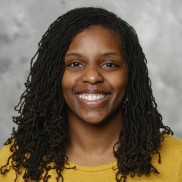
Can you describe what you do as an Early Head Start coach?
As an Early Head Start coach, my primary goal is to help teachers improve their teaching practices. I go to about five childcare centers and five in-home childcare providers and work with them when looking at their curriculum, their interactions with children and how their environment is set up.
Mainly, my purpose is to make sure that they're engaging in developmentally appropriate practices with children, making sure that the curriculum aligns with that, and that their environments reflect the families that are in their program because Head Start is very heavy on the family side. Even before being in Early Head Start, we realize that parents play a huge role in their child's development and learning. They are their child's first teacher, and we're the facilitators in helping them with that.
I just make sure that overall, when I go out of the classrooms, that the classrooms are reflective of who the children are and that the teachers are using practices that respect the children as individuals because even though they're young, they're still individuals that deserve respect, and that they respect their families as well.
What made you choose this field of work?
I really love kids, ultimately. Even when I was younger, I remember my cousins and just loving them. They were these little human beings, and they were always happy. I always wanted to make sure that the love that I have for children, I was able to display it not only in my family, but outside of my family. So, I started in early childhood education about 14 years ago. I was working as a toddler teacher. Granted, at that time, I had no idea what it meant to be in early education. I thought, “Oh, I get to play with all these really cute babies all day, and I'll make sure they're fed and taken care of.” But I then understood the learning aspect that came with it and having to teach them.
You're teaching them how to regulate, what it means to learn, how to go to a stranger — you're teaching them all these different aspects. I originally got my bachelor's degree in business marketing, and then I got my master's degree in early childhood leadership and advocacy. It was a big change, but I learned a lot. What I really wanted to do was be very impactful with young children, but then also get their parents to understand that just the simple things you do every day are part of teaching them how to be a preschooler or kindergartener. As time went on, I just wanted to be able to utilize the knowledge that I learned and teach others, too, because sometimes it's seen as being hard. It is hard work, but it's very rewarding to see our future leaders of the world grow up. I wanted to make sure that everyone understood their importance, and how loving them, caring for them and seeing them for who they are is going to benefit them in the long run.
What do you enjoy most about working with EHE?
I enjoy being able to have conversations with different individuals. Our team is small, but to be able to interact with researchers who collect all this data and to be able to say, “Hey, this is what we're learning about language with children, and this is what we're seeing if we make these certain changes — it will help with their language development.”
I like being able to collaborate with other individuals who are fully immersed in their work. Maybe I'm not in that realm, but to be able to have those conversations about even the different practices that I can do as a coach to help the teachers with their children. I feel that especially with the Schoenbaum Family Center, we're very heavy on language development because we understand how important it is for children to be able to not only understand it, but also to express language. A lot of the conversations we have are about the importance of literacy.
I appreciate the collaboration that I have with different individuals who are different entities throughout early childhood education, because I feel like it does help guide my work on what I need to be doing or if there's certain data that we need to collect. I and won't be as immersed as the researchers because I feel like they have a whole different kind of approach to it than we do. But at least it could get us speaking the same language if we know these are things that we need to look for, to make sure that we're continuously helping the developmental trajectory of the children that we serve.
Who or what inspires you?
I have a lot of individuals that inspire me. My father passed away when I was younger, so all I had was my mom, my aunt and my grandmother. My mom and my aunt are probably the most selfless people I've ever met in my life. They see the good in people, even when those people don't see the good in themselves. That helps me approach everyday life with individuals even when I'm having very tough conversations with people where I'm saying, “I know you understand me, but it's just hard for you to move past this tough situation.”
Being able to see the good in individuals, to help them, is important. Stacy Orbaker (the other Early Head Start coach) is also a very selfless person, but she always works very hard to make sure that she's checking herself and her biases before even helping someone, which I think is very reflective for anyone to do in this current state of mind. So, having that type of colleague, my family, people around me do certain little things every day — they inspire me to be the best that I can be and to look at situations differently than I would otherwise. It is now 2024, and children are different. I think the way we learn is different. The way information is presented to us is different. So, I just try to take little nuggets from everyone that I'm around to help build myself into a better person and to be able to assist those that need it.
How do you connect with the mission or the core values of the college daily?
The one thing that I really admire about EHE is the forefront of diversity. The college in itself is diverse, but even with us, there are predominantly Black or brown children in our programs. The same is true for families. Even in that, it is still making sure that we're connecting to what their cultures are. That’s something that I do a lot. I want to make sure that any time I'm talking to a family or a teacher, that they feel comfortable with me and that they feel welcomed and seen. And I'm not trying to project what I think they should be doing onto them. That comes with a lot of relationship building to be able to have those conversations, but also to see people for who they are.
That’s my approach with all the families and teachers I interact with. They hold value. I see the teachers, and I see the parents as the experts. I am there to supplement and to help. I’m also a Black individual, and I want to be seen as such, so diversity and inclusion are probably the highlight of my work. I want individuals to feel seen and to understand that they bring so much more value to this conversation.
What do you think makes EHE unique?
Just the diversity and the individuals and being able to comingle with so many different sectors of EHE. I do feel like even with the actual diversity, equity and inclusion program, I know that if I wanted to reach out to them to say, “Hey, this is the work that I'm trying to do, and I need help,” I can do that.
Even with the dean, there was a time he came around and talked about EHE and about trying to figure out how it relates to the very specific building that we were in and the core values. He has a lot of important things to do, but he took time to come and talk to us because he recognized the type of work that we're doing. Having someone higher up in the college who's like, “I value what you all are doing and what’s going on. Let's have a conversation.” It means a lot because that means that he actually cares. He's not there just because of his title, so, that makes us feel seen. He is, like, “Yes, I want to make these changes within the college and within our program. So, let's have a conversation.”
What is your proudest moment at EHE?
I have a couple. Being able to go from being a teacher in the classroom to now being an educational coach is a proud moment for me. It was a huge transition to go from working with kids all day to working with adults and kids. It took time to adjust but I'm proud of the place that I'm at, where I can have conversations with teachers. I feel like they value what I say and recognize that I know what I'm talking about.
Another moment is something that we realized when observing classrooms and having conversations with teachers — it’s that teachers were having a hard time talking about what diversity meant in their classrooms when it came to their children. So, I created what we called book highlights. We took culturally inclusive books and purchased them for the year for all of the classrooms and created these templates (in honor of Rudine Sims Bishop, the “mother of multicultural literature), so that they can read a book, and then they can implement different activities within their classrooms to help talk about diversity or display diversity in their classroom.
They can also share these books or templates with parents to take home, too. One thing that we realized is that even though we have diverse children, the teachers are not as diverse, and they didn’t know how to talk about these things. We had to get them to understand the importance of having these conversations because they're not going anywhere. Being able to build up their competence in their capacity to be able to implement these different activities in their classroom has been really successful. Now every month, they ask, “When are we getting our book?” A lot of them have not seen these books before, which is really nice to give them the opportunity to teach diversity through the literacy lens instead of having these one-on-one conversations that they were thinking they needed to have.
Do you have any hobbies or interests?
I really enjoy working out. I like lifting heavy weights. My husband and I really like to lift together, which is really nice. I have three children, and two of them are still in school. My daughter plays a lot of sports, and I really enjoy watching my children play sports, too, just for the competitive lens of it, because I competed, and my husband competed. So, I like watching my kids have fun.
Rebecca (Becky) Parker, Project Lead for Learning, School Leadership and Professional Development and Senior Project Manager, Center on Education and Training for Employment
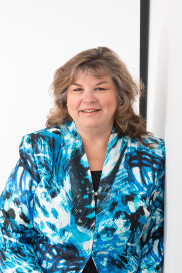
What is your experience with the culture of EHE?
I've seen a lot of changes over 25 years, and we've moved to a more flexible view of staff and equity. I see less of a hierarchy and more of a collaborative where everybody contributes around the table.
What is your experience working for EHE?
I'm on multiple teams because, being on soft money, it's based around projects. So whoever's involved in the project becomes a team. I would say that overall, it is professional, collegial, and people are valued for their contributions to whatever the initiative is or whatever the project is. I would say that I feel cared for and seen.
What is unique about your job or your team?
Because of the profession that I chose, which is teaching, I feel like I'm a bridge between our partnering sites and our core Ohio State team. I'm a bridge between new teachers in the field and their administrators or their faculty here and programs that they're in. I observe new career-tech teachers for Dr. (Chris) Zirkle, as well as work here in the center on other federal grants. When somebody asks me what I do, my easiest answer is, “I train teachers how to teach” because there are so many nuances to my job.
I think my role is unique because I work with budgets, allocating resources, managing people, managing technology, trying to make things work efficiently and effectively and managing a large federal project with millions of dollars. It encompasses a lot of different things. And I hear people say, “I want a job like yours,” and I'm like, “I don’t think there is another job like mine.” I think it's unique because it combines so many different activities.
Do you have anyone or anything that inspires you?
My faith is a big inspiration. I think that's more what I look to than people. I have great mentors in my life for specific things. But as far as inspiration, my husband and I established a 501(c3) to do mission work. That’s where I see my next steps — serving others and making a way for others to live more, whether that's through more and safer education. We do a lot of sponsoring of students in Belize to get educated because their education system is very different than ours. They have to pay to go to elementary school. So, there's no public or free education in Belize. It's a privilege to go to school. So, serving others is where my passion lies, whether that be local, state, national or international.
My other passion is caring for the aging. My parents are elderly, and I see such a technology gap that the elderly have, from banking to medical, etc. Everything's based online and through portals, using passwords. I don't know how elderly people manage if they don’t have family or a strong network close by to assist. COVID has taught me about the struggle for that age group. I think it's the teacher in me. I have the skill set to either offer my services or get them to the right services where they can get assistance or get help.
What is your proudest moment at EHE?
One was when I first took this job. My father was actually the director of the center, and I did a summer internship, a summer experience, because I was teaching school, and they needed some project work done. They asked me to come on full time. I didn't report to him, however. I can remember being called into his office in my role, and it was just weird having your parent be your boss. That was something that my siblings and I don't share, and I don’t know how many people really get that experience, but my father was so well respected that it was a proud moment for me to be able to be on staff and under his leadership. I'd always heard about his work, but until then, I’d never been under his leadership in a work setting.
Another proud moment would be when Dr. Zirkle went to the chair of the department to push that he wanted me in the schools, observing teachers. Had he not pushed for that, I'm not sure it would have happened. That was probably in 2018, So, I've been working with him since then, observing teachers and being out in the career-tech schools, which is my background. That's my passion, too. That’s what I love to do, being out and seeing teachers and students, being able to help them hone their skills. That's probably one of my proudest moments, when he went to bat for me and said, “This is who I want, so let's make it happen.”
How do you connect with the core values or the mission of the college daily?
We always have the strategic goals aligned with our strategic plan of the center. That dovetails our work. So, I ask myself: How am I connecting to the community, doing outreach? How am I furthering the image of Ohio State? How do I operate, who do I come into contact with? Then we make sure the activities that we do on our projects also align with the center and the college and the university. When you have those conversations at the management level, it's easier to do your daily work, because it's all aligned. We talk about it often. We make sure that when we're doing new initiatives, or we're talking about new opportunities, that we connect in those ways.
One of the big thrusts with our center is working with translational research and putting research into practice. So, we ask, “What does that mean and how does the practice align with those strategic goals and further the research, the scholarly publications and all the things that are important to the college and the university
What's one thing people don't know about you that they would be surprised to find out?
I play handbells. Our current church doesn't have a handbell choir, but I grew up in a church that did, and I played for a good many years. I got to the point where I could hold four bells at a time, which is hard to do. Usually it's one in each hand, and I could ring two in each hand.
What have you gained from working at EHE?
I've gained a huge network that now expands far beyond the university or even Columbus. It has allowed me the opportunity to travel. We have partners in Puerto Rico, so it's allowed me to travel there. I’ve given presentations in Washington, DC, so it's allowed me travel and gain experiences and networking opportunities that probably are the most beneficial to me that I'll carry with me the rest of my life.
What does excellence mean to you?
In my former world, I would say that excellence was perfection, but I don't believe that anymore. So many times we've had to get things done and out the door that may not have been perfect. But I think excellence is when you do the very best that you can. It meets the criteria, whatever that particular thing is. It doesn't necessarily mean it has to be perfect. I've let the perfection in my world go and look more at does what I do meet the function and have I given it my best try? If the answer's yes, then that's excellence to me.
Do you have any other hobbies or interests that you would like to share?
I have lots of hobbies and interests. I love to craft and do puzzles. I love to find an organization that has a need and fulfill that need. I love crocheting or knitting or selling some kind of craft item, but I like to craft for the sake of crafting, too. I love the coloring app and find that very soothing. I'm a people person, so I'm involved in a lot of groups. I sing, I used to play the piano. I don't play that much anymore, but music’s a big part of my life.
Eric Schwendeman, The Crane Center for Early Childhood Research and Policy, Senior Grants and Contracts Specialist
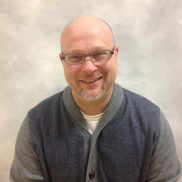
What do you enjoy most about working with EHE?
What keeps me engaged in the grants administration work I support is learning about everyone’s research, what they question, how they approach and of course what is learned and what comes next. It’s especially gratifying when I am involved for the entire “life” of the grant – — starting with a response to a funding opportunity, or discussion with an investigator, through the development and submission of the application, reading through reviews, then (hopefully) notification of an award, assisting with each project’s unique needs and seeing the results of everyone’s effort.
What is unique about your team?
I am struck by the special dynamism of the research enterprise at the college’s centers. It’s multidisciplinary, diverse, collaborative and mission driven. That dynamism resonates in so much of what we do, and translates to a wide and diverse research portfolio of service grants; training grants; large, multi-year studies; supplemental projects; research collaborations; and connections across Ohio State and with other national and international institutions and researchers.
Who or what inspires you?
My parents. Both were first in their families to go to college; both were smart, strong, independent individuals with vastly different personalities, but their union and everything they accomplished together was an object lesson for me in the fact that something can be greater than the sum of its parts. Their memory and legacy lives with me every day. Thank you, Jane and Harold.
What do you think makes EHE unique?
The breadth and scope of what EHE encompasses amazes me, and the many and surprising connections/interactions — both formal and informal — EHE has with everyday living.
What is your proudest moment at EHE?
I would never want to experience another pandemic, but in retrospect, how we as a college survived and learned together is both a point of pride and a source of hope for me.
Provide an example of what excellence means to you.
I think excellence means demonstrating that you care in whatever you choose to undertake. And always being a conscientious steward of resources.
Hobbies or interests you’d like to share.
I love learning something new, and that love manifests itself in my enjoyment of travel, reading and food.
Carlotta Penn, Office of Engagement, Discovery, and Global Education, Program Director – Community; Lecturer
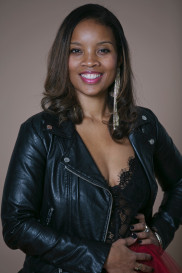
What do you enjoy most about working with EHE?
I enjoy working with my colleagues in the Office of Engagement, Discovery, and Global Education as well as you know, faculty and staff who we collaborate with across the college. I feel with any work that you do, the people that you're dealing with can make it really impactful work. Or they can sort of bring it down, make the work more challenging, and therefore, less impactful.
So the fact that I can work with people who are really good at what they do and also very kind and collaborative is a huge highlight for my work here. I enjoy that I'm able to work in both the international and local community engagement. It’s neat that my job crosses both.
What do you think makes EHE unique?
What makes it unique or what makes us special is the variety of disciplines that are under the umbrella, the College of Education and Human Ecology, as well as the various centers and units that all work together to think about education in so many different ways. I think we have a really large reach across Columbus and Ohio and even into the international space because of the different work that so many people are doing.
What is your proudest moment at EHE?
I really enjoy working recently with Dr. Jenell Igeleke Penn on the project ROOT Summer Institute. We've done that for two years, and working with students, younger students, high school students, has really been such a joy to have them to come into this space. Typically, in my work, I'm working with adults. So, it's been not only a great partnership between myself and Jenell, but also, most important is the work that we've done with the students and spending time with them. Being able to serve them has really been a highlight of the past several years.
Another proud moment that I've most enjoyed has been similar — working with the elementary school students as part of our Equity and Justice Read Around project. We put on an art show with students and student artists in February during Experience EHE Week. So, I work with my people and others in EDGE to do that, but we get to go to the schools, and read with the students and do art with the students, and then they showcase their work. So those two student-centered experiences, those two programs, are just so much fun and so fulfilling. I just love working with my co-workers on it, as well as working with the kids.
How has your role evolved over time?
I started as a graduate student, and I got my doctorate in multicultural and equity studies. Then I was a postdoctoral researcher with Reading Recovery and soon came over to EDGE. I started off as director of Partnerships and Engagement, and then my role evolved to having oversight over International and college community partnerships. That’s how I got to senior director of Partnerships and Engagement. I’ve seen the student side of EHE, having been here as a student, and then as a researcher, and then, now in my administrative role, helping to direct programs and partnerships.
Do you have any inspirations you’d like to share?
I'm inspired by my kids. They help remind me to see the good and to keep learning. And, you know, to be curious, and to care about the world. So that's helpful. Sometimes being in an office and facing challenges, it can seem like the brighter side of things can be more difficult. So, when you see (children), and you bring good energy to them, it's a nice uplift to face the new day with that positive, curious and caring spirit.
What’s one thing that people don’t know about you that they’d be surprised to find out?
A lot of people know that I like to eat, so people might be surprised that I don't like to cook as much as I like to eat. I will say that most people who I've worked with see me thinking about food while I’m at work. I don’t like to cook, nor am I good at it.
Do you have any hobbies or interests you’d like to share?
I write and publish picture books. My imprint is called Daydreamers Press. I'm releasing a nonfiction picture book called Step by Step, How the Lincoln School Marchers Blazed a Trail to Justice. It's about 19 Black mothers and 37 Black children in Hillsboro, Ohio, who marched in 1954 for two years to integrate their school.
Jossie Muñoz, Department of Educational Studies, Project Management Co-Director, CoIL Lab, Professor Matthew Mayhew’s Higher Education and Student Affairs College Impact Lab
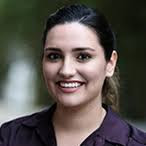
What do you enjoy most about working with EHE?
I enjoy the collaboration across departments and kind of leveraging the different expertise and skill sets that different staff members have. So, it's (about) how can we still make our deadline while adhering to some of (our financial) guidelines, especially as we work primarily with projects that are grant funded.
Who or what inspires you?
The thing that inspires me the most is really seeing the drive and the passion that people have, especially as it relates to working with and helping students. While we are involved in research, and sometimes don't get to interact with students directly, we know that the impact of the research that we're doing is going to ultimately help students. That really inspires me, seeing how other people are bringing their lens and their perspective and experiences to guide our thinking and, ultimately, offering research to support students. That inspires me to continue to do what I'm doing.
How do you connect with the core values or mission daily?
I would say that as a Latinx, with first-gen perspective and experiences that I have, I really value diversity and thinking through how we can collectively work toward bringing to light a lot of the issues that sometimes are very subtle. Also speaking into uncomfortable situations or experiences in order to work toward a solution — not surface level. For example, when we're hosting team meetings, I always like to do a quick check-in so that way we can kind of be grounded on how is everyone doing before we move into the work. Because oftentimes, if we're not in the right headspace, maybe we can table certain conversations or we can actually dive in a little bit more.
For me, it's always about checking in with people and making sure that we're building a community that is open and receptive to different viewpoints. Also, challenging each other to make the work better – I always tried to keep that at the forefront — what are ways that we are holding ourselves to a higher standard around being a community and really practicing what we preach, around these values, around language and behavior? I think one of the things that has been helpful in this role is viewing obstacles — or certain things that make it not a linear process — as an opportunity to really think outside the box and really be innovative. So, there have been instances where we try to give students (monetary) incentives, and sometimes it goes over the amount allotted for the year before we have to start having them get taxed on it. We have to really plan through — what do we want to do next year, so it makes it really streamlined for students? I would say this job definitely keeps me on my toes as it relates to being innovative, while at the same time being very reflective of how I'm presenting myself in different meetings and how I'm creating different spaces for dialogue and for opportunities to really improve the work that we're doing.
How has your role evolved over time?
When I first started off, it was more logistical and not so hands-on with some of the staff, such as the grads that we have on the team. As I've progressed in my role, (I’ve) really been more been able to oversee a team and really develop those opportunities for check-ins, both in informal and formal spaces. And then to really hear from each person what is working and what needs to be improved. And how we can continue to lead to ultimately keep that end-goal in mind of helping students and bringing about the best, such as research and support mechanisms for practitioners who are working more directly with students on a daily basis.
I think that it's really progressed. ... In the beginning, it was more streamlined because I was more so focusing on myself, and then over time as our team got larger, it was more reflective thinking about how to connect with people and make sure that we are creating support.
What is your proudest moment at EHE?
Because I'm behind the scenes, I would say one of the opportunities that presented itself for me to ... support the team was helping prepare for a presentation (by) Matt (Mayhew) and two other team members. (They) got to meet with Congress to highlight different policies that are grounded in research that can support the interfaith community.
I think that was really great because, even though I was not there in person, I was able to help review some of the materials, get everything going so … the team was set up, once they got to D.C., to connect and share some of the findings from the research, to hopefully impact practice.
What’s one thing that people don’t know about you that they would be surprised to find out?
Even though I'm afraid of heights, I try to occasionally push myself to get out of my comfort zone. In high school, I ended up being able to go on... a small plane. Halfway through the lesson, the instructor decided to let me take control. It wasn't as scary as I thought. I think the takeoff was the more intimidating part. (I) found my groove somehow. I still don't think I could skydive. That's on my bucket list — to just push myself.
What is it like to work with your team?
Everybody’s very talented and brings a fresh perspective. Whenever there's an issue or a situation that we need to address, it's us co-constructing solutions. It’s very humbling to be around very bright people. I love that each person that I'm able to connect with on the team brings their own experiences and perspective and skill sets. It’s a good reminder we don't have to deal with it alone. Whenever I need assistance or support or help, everybody's like “Yes, what do you need? How can I help you?” It’s very collaborative.
Going back to our hope as a (College Impact Laboratory) is to really put students at the forefront of our research. I feel very fortunate that I'm able to do the work that I'm able to do. Because I've been a practitioner, I've been on the front line, and it's difficult to just kind of have that brain space to really think and take a step back from the day to day. Having this space where I can collaborate and hear from, again, very talented people— I feel like it's such a blessing. I feel very fortunate that I am able to do what I can do.
Do you have hobbies and interests you’d like to share?
One of my hobbies is playing sports. I'm on a women's rec soccer team, so we get together on Sundays. It gives you an opportunity to get outside exercise. When I'm not doing that, I've been dabbling with gardening.
Amanda Crall, Office of Graduate Education, Graduate Associateship Manager
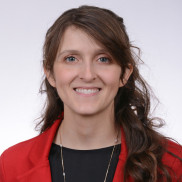
How has your experience with EHE been?
I've been here almost six years, and all the staff that I work with are so great. It's been nice that when you need something, you can reach out to people, and they are very supportive and helpful. I think that's one of the things that we want to continue doing is creating that atmosphere where we can support each other. We are trying to lift each other up and support each other and I really appreciate that.
What do you enjoy most about working with EHE?
The people really make it to where you want to go to work. They are interested in being helpful and participating in different things. We have so many opportunities in EHE. We have the chance to reach out to people, to interact with each other. From my experience, we have so many opportunities, it’s like you’ve got to narrow down what you want to do because you can't do everything, but that's a good problem to have. It's great to see that we've moved, we're moving, and we've moved to a space where we want to get staff involved in more and more things in the college. I think that's great.
How has your role evolved over time?
My role was completely new when I first started. I've learned a lot and things have changed. I think we've built up and created a more supportive environment not just for the students but also for the faculty and staff who interact with the students to provide more support in general for everybody involved.
In the grad student and GA (grad associate) space, I think that is one of the wonderful things about the position – we had an idea at the beginning, and it's met those goals and then some. So, I just hope to continue to grow with it and support the students, faculty and staff in this role. It’s definitely changed a lot because at first we didn't have anything, so we went from nothing to this full program. I think that's wonderful, what we've accomplished. We’ve become so much better at adapting and transitioning more quickly.
What is your proudest moment with EHE?
I don't know if it can be considered a specific moment, but I'm just so proud that we went from having this new position that we weren't sure about to working hard to identify the needs and how can I, in this position, fill those needs.
I think that's one of the biggest things — creating this position and making it what it is. I've really enjoyed the relationships I've built with everyone. The thing I really like about this position is it's centrally located so I feel like I get to be a part of everybody's team. You get to meet everybody and work with a lot of people in the college. I really enjoy that.
What have you gained from working at EHE?
The biggest things I've gained are a lot of leadership skills. All the teams I've been a part of have empowered me to create this position. Also, when I see a need, I am empowered to work hard to fill it. That support has really given me a lot of confidence, too. As much as I feel like I've given to the college, I feel like it's given back to me as well, from all the people I work with. That’s been really helpful.
What is one thing people don’t know about you that they would be surprised to find out?
I am a twin, and my twin works on campus. Her name is Brittany, and she works in the Ohio Union. It happens a lot that people will tell me a story, saying, “Oh, I saw you the other day, and you didn’t say anything, and then somebody told me you had a twin.” We are identical, and because she works in the Union and we have a lot of events there and it’s not far from Arps, people might see her around and not realize it’s not me.
Provide an example of what excellence means to you.
It’s trying to do your best, putting your best foot forward and always going into something even if it's considered a simple task, just making sure it's done right and completely and to the best of your ability. I think that's the thing. If you go in there with a genuine interest of, “I want to do the best that I can,” I really think that that exudes excellence when you have that positive attitude toward it.
Do you have any hobbies or interests you’d like to share?
I love going to concerts. I go to a lot. I think there’s like 12 I am going to in September. I really love going to see live music. My favorite band is Under Oath, so that’s another surprising thing is that I listen to post-hardcore pop punk music, and a lot of people don’t expect that. But there’s nothing like seeing your favorite band and feeding off of their energy. I like reading, working out and hanging out with my friends and family.
Donna Smith
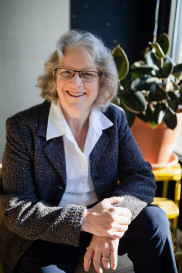
What makes EHE unique?
I think there are a lot of dedicated people who work in EHE. Also, the mission in terms of education is a tough one right now. I think that takes a lot of perseverance for people to be involved in that profession and understand its impact on young people in the future. You don’t get stagnant [in education]. You don’t teach the same way that you've always taught or do research in the same way that you've always done it. We’re always looking for different opportunities and the ability for people to learn differently.
What do you enjoy most about working with EHE?
I enjoy the people that I work with and the flexibility in order to work from home now, since I have a long commute. I enjoyed the flexibility and have been able to adapt during the pandemic easily because my children are grown.
Who or what are your everyday inspirations?
There’s good leadership in all of the centers that I work with. In addition to that, you have to have a certain internal motivation to make your job interesting when you work in financials. I've always said I'm an outdoor kid in an indoor job. So inside of me, I'm more of an outdoor person. But I work in financial stuff, so I have to mix things up or do different things in my approach to my job, which opens that door to give a more unique approach. Sometimes you can't wait for other people to make your job okay. You have to have a certain amount of you invested in making things okay. Otherwise, you go to work and just look for something to be unhappy about. So, in general I'm quite content.
How has your role evolved over time?
When I initially retired, I was a director of business and IT in public safety at Ohio State. That was a higher level responsibility job. Now, I work in a job that's much more like what I did in the earlier course of my career. I have a comfort level with returning to something that I'm quite comfortable doing. The last few years have been associated with financial and budget items as opposed to duties in the public safety unit.
How do you connect with the core values daily?
With Innovation, it’s a process of how you can adapt your own method of being an employee that suits the current situation. In implementing Workday, for instance, how we come up with innovative ways to deal with a new system compared to how we did things a couple of years ago. With Internalization, I don't just sit in the corner and do numbers. I do work more globally. I'm a big picture person. With Excellence, I want to serve people in a way that they feel is an excellent service. I think Justice and Diversity go together from a fairness standpoint. You know, I think all people need to believe that they will be equally treated in justice regardless of diversity.
For instance, I was married for 35 years to a man, and I have three grown children, and I share five grandchildren with my wife, so I am married to a woman and have been for the last 10 years. Sometimes the way you're treated is different in the world where I was married to a man and had three little kids, versus how I could be treated as a person who's married to a woman or a woman who's married to a woman. So, I think I'm keenly aware of those things. I always have been to a degree, but I think with CETE and the other EHE centers, we have a very good handle on justice and diversity issues. We base what we do on the core values.
My son graduated from the Education side, and my daughter graduated from the Human Ecology side, and they were involved in the mission of the college. It’s been a part of my life and my children’s lives coming here.
Another thing is that with the dean, the changes are apparent in his hiring of faculty and staff in terms of diversity. There have been efforts placed there, which sometimes people talk about but then you don't see any change. I think we can look around, and we can see that it’s not just talk.
What do you like most about working with your team?
Even though I work remotely, I would say we've been able to maintain a team. We meet online regularly. At times when we're in the building, we gather, but we've been able to maintain a certain level of connectivity, regardless of whether we're all in the building at the same time.
What is your proudest moment at EHE?
Seeing over time fiscal operations that have had some struggles to be able to run more smoothly and to be more stable. In other words, when I came to CETE in 2015, they were about 18 months behind, and they asked me if I could handle that. And I said, “Well, I sure hope so.”
So, taking that to a more stable and well-functioning fiscal unit is an accomplishment. That's probably what I would say is the biggest impact that I've been able to have. I can bring that experience, to not panic, and to just say, “Okay, we're going to work this out, and we're going to fix this, and we're going to make it better, and over time, I think that's probably the biggest footprint you'll see.”
What's one thing people don't know about you that they would be surprised to find out?
I would say I am a softy grandma. I spoil my grandkids, and they can pretty much get away with anything.
Do you have any hobbies or interests?
I am starting back to do some golfing. I enjoy it and have been enjoying it with one of my sons. I love the outdoors in general and travel.
Jennifer Foster, EHE Office of Business and Finance, Admin Support Liaison Specialist
What makes EHE unique?
I’ve worked only at EHE my entire time at the university, but I think it's the diverse passions of my co-workers. You have people who are subject matter experts in kinesiology, nutrition, speech therapy and fashion. It’s just a wide range. It's not like a college of business where most are experts in the area of business. These people are leading experts in such a wide variety of disciplines that it makes them unique. It brings forth a variety of people.
What do you enjoy most about working at EHE?
I’ve enjoyed my co-workers. Also, I’ve been able to be mentors to many different kinds of people. I think that's been very good for me. I think that the leaders are to be experts in their area. I think they rely on you to be an expert in your area, and that's really helpful for you to be able to do your job. They are not trying to micromanage you or one up one another here. They rely on you to be the expert.
How has your role evolved over time?
It’s been very different, mostly because of Workday and COVID. I've been tasked with being a champion of change. Even in the face of maybe not 100% understanding the change, the impacts and ambiguity can be hard. Being a champion of something that you don't fully understand is not an easy task. You have to have a lot of faith, knowing it's going to be okay. You have to be constantly changing. In the beginning, we were just trying to be positive and learn. Now we're trying to go back and relearn things that we may have missed. So it's a constant situation of being a champion of change. I think that’s the biggest thing in the role.
How do you connect with the core values daily?
That’s pretty easy for me because the core values are, in fact, my values. When they were published, it was easy to live by them. Excellence is the one that I always resonate with most. I try to be excellent in the small things, and they all add up to a daily excellent life.
What is your proudest moment at EHE?
I’ve had a lot of co-workers come into my life that I have been a mentor to. They have gone on to do incredible things, both within the university and outside of the university. I think they relied on some of the things that we talked about through our conversations, so the fact that I was able to help some of my younger co-workers excel and meet their goals has been a really proud moment for me. And the fact that I still keep in touch with almost all of them. Even though they're not here anymore, they text me and call me. That makes me proud.
Some have gone on to do great things. Most of them are way younger, but we've been able to bond through the work.
What’s it like working with your team?
My team is really good. They're the most supportive group that I've had in all my time in EHE. I mean, early on, we had some pretty good ones, but this is by far a really good team. I think a lot of people enjoy the environment or like working with everyone. Pretty much everyone here is great. It's been great for me to meet all the different people.
Do you have any hobbies or interests you'd like to share?
My family is very important to me. My husband and two adult children are everything to me. I have some fabulous sisters. I am one of four daughters, so I spend a lot of time with my sisters. I'm happy about them every day. My daughter lives in Seattle, so I spend time going to visit her, and she is able to come visit us, so you know that that's important. It's mostly family and small trips with them. I think from COVID, we learned to appreciate the small things that we have.
Stefanie White, Program Coordinator-Special Events, Advancement and Alumni Relations
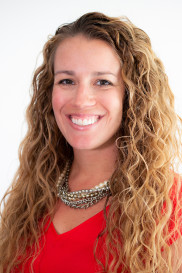
What has your experience been like with EHE?
I started in May of 2021, so at the time, we were working from home, and my experience with EHE had been limited. The experience that I have had has been really positive, and I have a really great team. The Advancement team is awesome. I've never worked with an office like this, where everybody cares about everybody. It’s such a positive, friendly environment. I worked a lot with (the college’s) Marketing and Communications as well, and they've always been very helpful and friendly. I’ve worked with the dean’s office and worked with Dean Pope-Davis a lot. My overall experience with EHE has been great.
What do you enjoy most about working with EHE?
I enjoy working with the Advancement team. Julie Miller is the only good boss I've ever had. She's excellent. She's an excellent support, but she also allows me to do my own thing and is there as a resource when I need her. I would say that about Pablo Banhos as well.
Who or what inspires you?
My kids always inspire me. They inspire me to do better and to show them what women can do. They're both girls, and I can show them that they can be professional but also have fun at the same time. I always want to provide the best experience. I'm inspired by people's ideas and getting to bring them to life.
What makes EHE unique?
I think it's the people, truly. I've gotten to work with a bunch of different people in different departments, and they are all willing to step in or help or answer questions. But they also have been really easy to work with and appreciative when I've planned something for them.
What are three words that describe working at EHE?
In my experience, I would say collaborative, teamwork and innovative.
What's one thing people don't know about you that they would be surprised to find out?
I love to cook. I think for Thanksgiving, I hosted around 40 people. I also graduated from the college when it was just Human Ecology. I like to dance. When I went to school here, I enjoyed line dancing.
Do you have any other hobbies or interests you’d like to share?
I like sports, hiking, playing tennis, riding bikes, playing volleyball with my daughters and anything outside really.
What is your proudest moment at EHE?
I think the Black Alumni Reunion. We’ve never done anything like it before, so it was really planning from the ground up.
Provide an example of what excellence means to you.
Follow through is really important, so doing what you say you're going to do and making sure that you don't quit until you're satisfied with your product. For me, that’s events and making them successful. To the public eye, we want it to look as if there were no problems.
Event planning is what I was supposed to do. I think I'm good at it because I really enjoy it.
Austin McClellan: Graphic Designer for Office of Engagement, Discovery, and Global Education
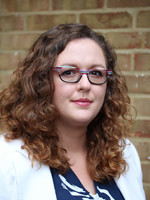
How has your experience with EHE been?
I've really enjoyed the experience that I've had here with EHE. I'm very appreciative and grateful to be a part of a culture that is all about learning, innovation and asking questions. Our team and office touches on a lot of different initiatives, some coming from the dean’s office, but always supporting diversity, inclusion, outreach and advocacy efforts.
How would you describe your team?
Our team works both individually and together. Noelle (Arnold) has said that we're good at what’s called a pinch hitter. When something comes through, such as a project, and we have to work on it quickly, the team will work on it together through our collaborative efforts.
I've worked with a lot of different departments, and I really enjoy working with everyone here. I enjoy the educational standpoint. With my more consumerism background, it was more about, will the consumer buy this? With the college, we are engaging a person with education.
Who or what inspires you?
My team often inspires me to put in work or change in a way I wasn't expecting to. It helps me stay active and on task and make adjustments to changes. I'm just awestruck by the accomplishments that everyone in this college has achieved or is working toward. I get really inspired and excited when people are working on something more substantial.
What makes EHE unique?
We are focused on education, excellent people and the college’s excellence. The leaders, faculty and staff are the best. They are really great to work with; they are really good at what they do and are always very flexible with their work.
Their strong passion gets me excited and ready to go and work on things. When I know the drive behind something, it really changes the way I approach it in a creative process.
What is one thing people don't know about you that they would be surprised to find out?
I'm a haunted house actor and face painter. I love to see when the lights are on and look at the props, the makeup and how everything looks. I also love to play Dungeons and Dragons.
What is your proudest moment at EHE?
When I was helping with the Experience EHE branding for the logo and the core value options, and especially when Nikole Hannah-Jones came to speak. I enjoyed her speech and learned a lot about why I'm here at EHE and ... what education is meant to do. It’s meant to take you out of your comfort zone and change the way you see the world so you can reach for greatness.
And how do you connect with the mission or core values daily?
Sometimes people perceive design differently, whether it's with color associations (such as what scarlet may mean to someone) or even accessibility. People perceive them differently, and I'm keenly aware of those differences. Through innovation, I've been working to connect the latest and greatest design trends. I connect to excellence by thinking of the students in the community and the impact they have on everyone that they meet. With internationalization, I work every day to engage those on a global scale. I try to think, where will this live? Is it going to be on the web? Is it going to be in print? Is it within the Ohio State community, or is it internal or external? I am always thinking about what is going on in the world.
Do you have any hobbies or interests?
I do oil painting, and I sew for cosplaying (dressing up as a character from a movie, book or video game). I love going to anime or comic book conventions. It's so much fun.
Ivan Stefano: Director of Intercultural English Language Programs
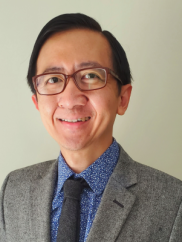
What do you like about the culture of EHE?
One of the things that I enjoy about working for EHE is the collaborative culture that we have here. I've enjoyed working with the faculty and staff in my unit, the Department of Teaching and Learning and within the college. People are very helpful and generous with the sharing of their knowledge, helping one another and supporting colleagues. The collaborative culture is something that I appreciate. If I have any questions, or if I need help, there's always someone within the college that I could go to.
I wanted to create a culture in IELP where people can not only enjoy their work but also thrive and have support in the things that they’d like to do. I want to say, “How can I help you achieve that?” I want them to feel good about what they do. I want them to know and feel that I appreciate their ideas. As director, I am there to help make things happen, and I know my team makes things happen, too.
Our team is made up of people who make IELP a unit that people respect. They come to us because they know we can provide high-quality English language programs and great services for them. Faculty and staff on campus, and partners in other organizations, approach us and trust us with what they want to accomplish, and we collaborate with them.
What is unique about your team?
My team consists of people who work with international students and communities, and they have a lot of international experiences. Many of them have lived abroad and speak another language. Our space is very intercultural and multilingual. They're not just bringing in academic knowledge or expertise; they have world views and experiences that make the team very globally minded. Within IELP, we teach English to our international students and create special programming for our partners on campus and for international partners in other countries.
How has your role evolved over time?
When I first started my position, my responsibility was for our American Language Program and International Special Programs. That has evolved to all units within the Intercultural English Language Programs. I started with half of IELP when it was called the ESL Programs. Now, I oversee the whole program. So that gives me the ability to do more creative things, because then I can bring in people together from across the units within IELP. I work with people who have expertise in writing, speaking, grammar, linguistics and other areas in multilingual language education. I work with so many talented people, which gives us the ability to serve our community better by having everybody collaborate.
What is your proudest moment at EHE?
I am very proud of leading the effort to change the name of our unit from the English as a Second Language (ESL) Programs to the Intercultural English Language Programs (IELP), because that really represents who we are and whom we serve. Our students are our focus, and we are here for them. The name change reflects the population that we serve and the intercultural nature of the work that we do. I think it's more inclusive. We did it intentionally and put in a lot of thought when choosing the name and the reasons behind the change. It took us about a year not only to complete the process of the name change but also to adjust in other areas (e.g., course names, website, name on the wall). But for me, it was quite an accomplishment, personally and professionally.
How do you connect with the mission or core values daily?
One of the core values of EHE that really resonates with me is internationalization. My unit directly supports that core value. We are at the forefront of the internationalization initiative at the university as well, because through our programs, we interact at some point with the majority of our international population, either through assessment, courses that we offer, informal interactions when students come to our office or through our special programming. That really supports the mission and the core values of the college, and I appreciate the support of the college when it comes to internationalization because EHE really means this, and I feel like there's still a lot more that we can do.
One of the pillars of the college is to enhance our global reach and local impact. That speaks to the work that we do because the impact can be felt here locally, and we're doing a lot of things that reach the global world. We can learn so much from our international students and those in the international community. They bring different perspectives that enrich our culture here in the college and also in the university. International students, postdocs, scholars and professionals from other countries bring global perspectives, awareness and engagement to the college and that is very important for our growth.
What’s one thing people don’t know about you that they would be surprised to find out?
I am a commercial aviation enthusiast. The people who are into this are called AvGeeks. I can look up to the sky, see a plane flying over me and can tell you the type of plane it is. I like being able to watch them and identify what kind of aircraft they are. I sometimes refer to cities by their three-letter airport codes. I also love to collect airplane models. I am just fascinated by commercial airplanes.
What have you gained from working at EHE?
I think we are able to do what we do in IELP and enjoy it because I feel like we're valued by the community of the college. That makes a huge difference when we are seen as a partner in the college. People show their appreciation for us and the value that we bring, and we want to show the same appreciation to the people in the college. I am grateful to so many of my colleagues in the college, the Department of Teaching or Learning and IELP. I feel the support of a lot of people, and I appreciate the positive work environment here.
Megan Znidarsic, Educational Studies & Teaching and Learning, Finance Officer
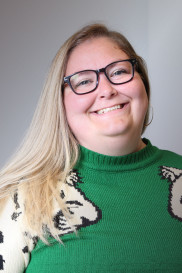
How has your experience with EHE been?
I would say pretty positive. I get the unique opportunity to work with two different departments. I have a lot of cool things that we get to do. Teaching and Learning does a lot of interesting stuff that involves undergrads. They also do different kinds of research and one-off projects that I don't get to see at Ed Studies and vice versa. In Ed Studies, you get to know a lot of the graduate students a bit better because there's a greater number of them.
The faculty are all really great. You see the passion that they have for the students, which is refreshing. They care about how their students are doing, what sort of experience they're having through school. I'm an alumni of OSU (political science), so I see a really important aspect to the university that others don't necessarily see. There's the, “Hey, my grad student had a rough time doing this. Maybe we should change it next time so that someone else doesn’t go through it.” I think that that's great.
I think the other thing that's cool about my two departments is that they're very closely related. There's a lot of faculty who do research projects together and work (with partners) in different states, which is also something that is a little bit more rare in the colleges in general at OSU.
The staff are also really great. One of the things that staff always appreciate is having a good core group around them to rely upon, go to and use those resources. Especially in the fiscal side of things, we have a really great team. Jerri (Sutton) and Kelly (Crawford) are some awesome leadership role models. They are people you can go to with problems or things that you don't know how to do and need some help with. They're always willing to pitch in, so that's really awesome, too.
What makes EHE unique?
There is true compassion for the students. There is the want to make things better, find a problem, and solve it, versus find a problem and work around it.
How has your role evolved over time?
I would say it has pretty heavily evolved. I started in EHE a while back and worked as a fiscal coordinator. Then I went back to engineering, then worked for three more years as a fiscal coordinator. I came back, worked in Ed Studies, at first as the fiscal officer. Tthen I was asked to take over Teaching and Learning as well. I moved from one department to two departments. I'm doing essentially the same work, but I'm doing it in two separate departments or separate academic units.
Do you have any leaders who inspire you?
There have been two really awesome fiscal people that are pretty great role models and also are people that even though you may not work in the area anymore, they're always really good resources to keep in your OSU repertoire. Christina Renner in engineering is a wealth of knowledge and has been at the university for a really long time. She’s a great example of institutional knowledge and leadership and is always willing to help, even if you're not in the same area.
The other person is Jerry Sutton. She is an awesome person to aspire to be. She is somebody who always has an answer. If she doesn't have an answer, she finds you an answer. She's super helpful, and basically, anything that you want to do that you don't exactly know how to do, she's been there, done that, and that's really great.
The nice thing about OSU is that there are always resources to find in people that you've worked with before. The great thing about having a longer career at OSU is that you build this team of former and current coworkers who have done something similar. I think that for most of us who have been here for a while, you have this informal team that you rely on. Before you take things up the chain, you can bring it to your informal team to see what they would do in a situation. That's one of the really cool perks of being at OSU. You build these friendships among coworkers that last no matter where you are in the university.
What is your proudest moment at EHE?
It wouldn’t be the proudest moment, but probably that I always feel really great after having a one-on-one with a faculty member and we were able to solve a problem or come up with a plan or solution. They feel a sense of relief. The item that's been weighing heavily on them is taken care of or has been resolved. It’s the best feeling.
What's one thing people don't know about you that surprise them?
I have a couple. I have five kids. My oldest just turned 13, and my youngest just turned four. I am also the head coach for the women's rugby team at OSU. I played at OSU. I played competitively for a women's team. I coach the women's team, and I coach little kids from second to eighth grade.
Can you provide an example of what excellence means to you?
I think that excellence is giving your full attention and effort towards your objective. It is something that changes for every person. There’s not one standard for excellence, but I think that the other part of excellence is doing (your work) with the best of intentions. We often get into the habit of going robotically or stoically through our job with the everyday drudgery that we all go through. Sometimes that monotony gets us down or doesn't allow us to do things with excellence, because we're going through it mindlessly. One of the things I try to do is be happy when I'm at work and bring that into the work I'm doing. If I'm focused and I'm giving my all towards it, part of that for me is bringing a good attitude. If I'm not, I'm frustrated about it, I'm mad about it. I'm not really giving it my all, and I'm not really putting in my full effort. Trying your best, putting all your effort and all your focus on something, and then bringing a really good attitude, sort of a trifecta that puts you into a sense of excellence around what you're doing.
Do you have any hobbies or interests?
I love to read; I'm a huge reader. I set a goal of 50 books every year. I obviously very much love rugby. I like to go on adventures and go traveling, even if it's a small weekend trip. I like to get out of the house.
Michele Sanderson, Department of Teaching and Learning, Program Manager
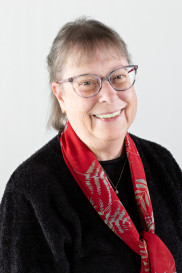
What has the EHE culture been like for you?
I've been here for 25 years and I think the EHE culture is what drew me here to begin with - the warmth and the commitment to the students in EHE, the thinking outside the box and in new ways about the lives of young children. My experiences with the primary program through the A. Sophie Rogers lab school when it was in Campbell Hall, and then in the Schoenbaum Family Center, drew me initially. The passion for teaching, education, equity and diversity, and reaching all learners throughout our college, is what I’ve really loved about being part of the EHE culture. Also, the collegiality across the board. Those things give life to your work.
Who or what are you inspired by?
Deb Zurmehly and Maggie Spangler are an inspiration. I've known both of them for a long time, and they give a lot of support. They're great sounding boards and are there whenever you need them. I also feel very fortunate to be working with Jenell Igeleke Penn. She and her work are an inspiration. She is a great source of support and resources. We just had a big change with Dr. Augustine leaving; she was a huge support for me personally in the program, and I loved working with her. I also find my faculty lead, Dr. Katz, who was also my advisor in my doctoral program, as one of those outside-the-box kind of thinkers. She supports us, understands the work that we do and provides great leadership for us in the early and primary childhood part of our program.
I am also so happy to have both Dr. Subedi and Dr. Miranda with us. I've been able to work recently with Dr. Subedi in taking care of some student issues. I had the same experience with Dr. Miranda last year. I learned so much from her in terms of her sharing her knowledge and collaborating on how to problem solve a difficult situation. As busy as the chair is, she was always there, a great support through the whole process, which lasted quite a long time. From the top down, it is a great group of people to work with.
Among the department’s program managers, we developed a community; we meet on a regular basis. They are people that you can problem solve with. The ideas flow well between all of us. There's such a depth of experience among us, which helps lay a good foundation and brings strength to the program from the everyday experiences of the students.
How do you connect with the mission and core values of the college?
Certainly in the early childhood experience, that's been a great portion of my work here in the college and continues to be. We are so involved with the students, and so front facing with them, because those core values and the mission are really critical to not only thinking about education, or the educators that we're developing, but also we want them to experience those things as they are here with us, not just take them out to the world. I think what's at the heart of education is relationships, from bringing those core values to the students every day in our interactions with them, to teaching with them, to problem solving in their field experiences with them, to making sure that they get a broad and diverse experience while they're here. That's how we bring the core values into our work on a daily basis through the intimate relationships with the students.
How do you grow professionally in your position?
I've had a lot of experiences here. I came in as a grad assistant at the laboratory school, and then moved into a master teacher position, then became the director of A. Sophie Rogers and helped spearhead the effort to move to Weiland Park and the building of the Schoenbaum Family Center.
Then we had a chance to move this position back into the college. I think I've been challenged and have grown in my leadership skills and abilities. I have grown in terms of my values around teaching; what I believe is important about teaching has only deepened. Also, one of the benefits of being here is that you can take courses. I completed my master's and then the educational specialist. The doctoral program has contributed to a broader and deeper way of thinking about education.
I have always loved the balance between theory and practice. I'm interested in the theory and how it comes through in the practice. My experiences here have helped me understand that better and build on it from when I was a teacher in a classroom to now being a teacher of teachers. So, I feel like I have gotten a depth of experience here that I wouldn't have gotten anywhere else. It's made me a better teacher for my students, which is the most important thing, and hopefully a better colleague for my peers.
Hobbies or interests?
I love antiquing and going to flea markets. I love crocheting. I find it relaxing. I'm into making throws for people right now. I also like visiting my children. My son lives in New York City, and my daughter is currently on tour with Hamilton as an automation specialist, so I go visit her in different places around the country. That’s been quite fun. I’ve just taken up watercolor painting, and I also like to bake cookies.
Robin Chenoweth, Office of Marketing and Communications, Editorial Designer
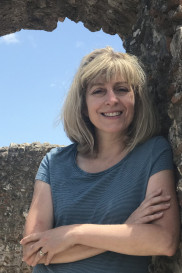
What has the EHE culture been like for you?
We've had a lot of people come in and out of our team, but it's always been a great team, and I really like where we are right now. It's probably the best place that Marketing and Communications has been. It's so collaborative and creative. We think outside the box. I've always found this to be the case with the faculty that I interview, too. They're insightful and on the cutting edge of so many meaningful topics. They know what they're talking about, but they also know whatever it is that they're studying and where it stands today, whether that be literacy, higher education, special education or nutrition. It doesn't matter who it is. We've got so much expertise in our college, and I find that almost to a fault, they are so passionate, and they really are willing to share that passion. I get great responses from all faculty members, and I don't know if that's the case everywhere. I feel like they appreciate what I do, and therefore they help me to do it. And I love the direction our college is going. We are at the forefront of so many issues, and we are making a difference. It feels really good when you can work and make a difference in the way our college does. And I love writing about that and producing podcasts about that.
What is it like working together as a team?
We are very collaborative. We don't take ourselves too seriously. But at the same time, we're serious when we need to be. We know how to have fun, and we know how to get down to business and to do our jobs. I've always loved bouncing ideas off of everybody.
Because my experience is one experience and is different from other people’s experiences, I've gotten some of my best ideas from the sessions that we have with the team. Some of our highest performing podcasts and stories have come from ideas that we come up with together, and that's just a really fun way to work. A team approach to generating ideas is always better. I enjoy working with them. There are some really great minds in our group, and together we're so much stronger than we would be working in isolation.
What do you enjoy most about working here at EHE?
Exploring topics that are relevant to people today. I just did a podcast about using sports as a platform for civil rights. Whether I'm talking to alumni or to faculty or students, I think almost everything we do relates to issues that we see right in front of us. Education touches on so many of those of those things. We’re talking about LGBTQIA+ students, college students who are parents themselves and struggling to get a degree. The topic coming up is on sex education in schools and the importance of it. Just like everything out there in the world, it seems like we have a touch point for it at EHE. Often, we have somebody actually studying that issue. And when you can tap into that expertise the conversations that come out of it are just mind blowing to me. I love sharing them. We are impactful. I think that's what I enjoy the most.
Who or what are you inspired by?
I have to give a shout out to Carol Delgrosso. I just handed over my script to her last night, and she takes it and does this magic with it. It's a whole different skill than what I do. She makes it sound so good, and I’m always in awe of how she can put the right clip of music with the right emotion, right where it needs to be. I'm inspired by the work that she does; it really makes our work better because of her commitment.
I'm also inspired by the dean. He came from humble beginnings, as a lot of our faculty did. They came from places and situations that they had to really struggle and work hard to get out of. I love that human story. I just did a story about Frank Vizcarra. He's one of our alum who lived in the barrio in Tijuana, Mexico, and he believed in himself. He kept pushing. Other people believed in him. I'm inspired by the stories around me and by talking to the successful people who did not come from a place of privilege, and yet still prevailed and pushed forward. That’s something I am trying to find out. What keeps them pushing and trying until they were able to succeed? I love trying to pinpoint what that is. We have so many stories like that in our college. I'm inspired by them. I also have to say my mom inspires me. She made me into a compassionate person and someone who was fascinated by other people. We used to sit at the mall and just watch people and wonder what their stories were. I'm so lucky because now I get to tell the stories.
How do you connect with the mission of the college?
Well, I'm lucky because that's easy. I'm kind of the messenger of the college. All I have to do is to take the great work that's being done and amplify it. And that's what I do all day. I'm calling and talking to people about what they do, why it's important, how it can help other people, and how people can change the world, basically. What can we do to make our world a better place? And that's what our core values and mission, our pillars, are about. I line up everything that I do with those. It's not hard because everybody's already doing it. So, all I have to do is find out ‘what are you doing?’ ‘What are you worried about?’ And it's all right there. I think when it comes down to it, everything we do is about helping people. That's basically what I always have believed and I've been brought up to believe. When faculty, students, staff or anybody is living that out, that's easy to do.
How do you grow professionally in your position?
I'm doing voice lessons right now for the podcast. I’m continuing to work to be an engaged human being in the campus community. You need to be engaged because otherwise, we have only one perspective. Maybe we have multiple, but in order to really understand what's going on around you, you have to be engaged with others. I try to have as many touch points around the community as I can without wearing myself out.
I also love being involved, and I have a nonprofit that I run for schools in Africa. That takes a lot of my time, and a lot of my energy as well, but it keeps it real. We complain about a lot over here, but they're having a hard time over there. They're having a hard time feeding kids, and not just our (school’s) kids but the families in the slums – it’s hard for them. So, you don't feel like complaining about unimportant things. I’II see that going on in the world, and I try to stay in touch with that as best I can through the organizations I volunteer with and just by having relationships with people who are different than me.
Hobbies or interests?
There's the schools in Africa, called Lohada, and I run a nonprofit called Kesho that helps to fund them. I have two kids, a 24-year-old and a 22-year-old. She's now working in Washington state, and he's a senior at Ohio State. I love gardening. I've got a little kitchen garden right below my window. I love cooking, so growing flowers and herbs that I can cook with is fun for me. I really love hanging out with people, such as going out to dinner or getting groups of people together in the backyard. We have bonfires all the time when it's warm enough, and we have people over. We sit out there and just talk about life.
Pete Locascio: Student Services and Academic Advising, Director of Curriculum Standards and Academic Policy
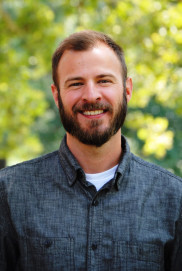
What has the EHE culture been like for you?
Especially in the past few years, my impression of the college has been we're all in this together. With a lot of new challenges that came up that we had to respond to, it was nice knowing that everybody in the college, no matter what team you were on, had each other's backs.
You realize that we're only able to accomplish things as a team and to make progress by looking at ourselves as a holistic unit, working toward a similar mission. That's been really nice to see and something that I've come to appreciate and lean on quite a bit in my own work.
What is unique about your team?
It is probably the amount of things that we do and know. The umbrella of undergraduate student services or undergraduate academic affairs covers many things, such as academic advising, career services and scholarships, but also really small things that have a big impact. Little policy details that we need to know or procedural things that, if we do them wrong, we could break something. So, we have to be responsible for a lot, and we have to know a lot.
I've been really impressed with this team's ability to continue moving forward in times of uncertainty and change. It can be hard to keep your eye on the mission but keeping our eye on the mission helps us care about the small stuff. That helps us feel like we are doing something that's truly important.
What do you enjoy most about working here at EHE?
I really do think it's the people. It’s the relationships. If I run into a hurdle in my work, usually I am a phone call away from somebody who can help with that. Maybe I annoy my colleagues when I'm like, “Hey, let's jump on a call,” but it's really helpful and calming to know that someone can help out and as well as jump in and start to explore where we can find solutions. It’s been a really good experience.
Who or what are you inspired by?
I think I'm inspired by those that I work with every day. It’s important to keep your composure in the face of a lot of work and being super busy, and there are sometimes situations that can keep you on your toes.
I'm always impressed and inspired when I can see an email from a colleague who is able to address a situation and is able to make someone feel heard and valued, but also able to bring down the temperature of whatever we're talking about. Often that's what I think students or parents need, is just someone to listen and say, “I hear you, and here's how we can look forward.”
I'm also inspired by the advisors on the team, by those that I work with who constantly are staying on their toes and doing good work and staying positive about it. That's something that keeps me going.
How do you connect with the mission of the college?
Our office is at a time of transition where we have some new things coming in the next couple of months. It’s given us an opportunity to rethink our own mission statement, our own values and being able to look at those things at the college level has helped because it allows us to align to the bigger picture. It has been a good set of guidelines in providing us with the structure that we need. We are asking ourselves how we fit into that? Are we reflecting that? Do our values reflect that and how we approach our work with students?
I think the mission that we focus on primarily as a team is that student experience piece. We know that great education is happening in the classroom. And we want students to be challenged there. We don't want students to have to deal with unnecessary hurdles before they get into the classroom. We want the challenge to be the educational process.
So, the way I view it in terms of our mission is, there's a path in front of students, and if the signage is bad and it's confusing, they might turn the wrong way. The path that has rocks in it, trapdoors and hidden things are all barriers that we work to alleviate so that it's a cleaner path for students to walk down.
Our mission here is trying to identify those things to be more efficient, to be more effective and, overall, to increase that student experience so that they walk out of here, not with just a great education, but knowing that they had some pride as both an OSU student and as an EHE student.
How do you grow professionally in your position?
Every day brings new situations, and I think it's important to put yourself in those situations – not to avoid things that seem a little bit uncomfortable or seem a little bit outside of past experiences. That’s how we grow, learn and practice so that we are better at things. So, I try to stay really positive as much as I can.
I kind of look at things as if everything is an opportunity to figure it out a little bit more. That's been useful, because it can be easy to get bogged down and forget the reasons why we're doing this. I try to lean in on what our mission is, what our values are. Then it makes that hard conversation with a parent a little bit easier because you know why you're doing it.
Hobbies or interests?
I have two kids under the age of five, so most of my time is just being a dad. When I have time, I like to play basketball, hike and camp. I like history a lot, so I enjoy visiting different historical sites around Ohio.
Megan Tuttle: Department of Educational Studies, Admissions Specialist
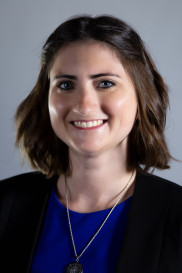
What has the EHE culture been like for you?
One of my favorite things about working here is the people. Working with all my team members and department leadership, I’ve always felt really supported. The college environment in and of itself has been really supportive of me over my time here. I always know that if I have questions, they are going to get answered or we're going to dig into it and find out who has the answer. So, overall, I just feel really supported and thankful for my team, the environment and the people within the university. The people that you work directly with are the people that kind of make your day.
What is unique about your team?
We got a lot of newer members to our team over the last year or two. I think that is wonderful because it brings new ideas. It also has shown that the people that we've hired are ready to go and hit the ground running. It’s brought in new energy and a lot of people who are ready to find new ways to do things.
What do you enjoy most about working here at EHE?
One of my favorite things – I process our admission decisions. Anytime I get an email from our faculty to admit a student, that's my favorite thing. I know that I'm making somebody's day by letting them know that they got into their grad program, either pursuing their master’s or their PhD. Just in and of itself, that really puts somebody on to their academic goal. So that's always been my favorite part of this role. It’s a good feeling.
Who or what are you inspired by?
Alisa Tate is definitely one of my inspirations. Her name is well known around the college and the university. She is just a bright light. She's very involved with our staff, and she's one of the people who is always pushing us to look at what's next for us and continuing to grow, either in developing our role and kind of not sitting stagnant and just meeting the status quo but continuing to lean into invention and growing what we can accomplish. She's been a great leader, and I really appreciate all that she brings to guide me. She’s seen me through a couple of different positions here and has always been my biggest cheerleader.
How do you connect with the mission daily?
There are a couple of different layers. I always try and lead with the best quality of work and ensure that if we find a problem, we're fixing it and not letting it fester. So, that's always my goal and what I do.
Also, we have a strong goal for internationalization and supporting our international students. Our department doesn't see a huge number of international students but I think we've seen an uptick over the last few years. We want to make sure that those students feel very well supported. We know that it’s a huge transition coming to the U.S. and Columbus in general. Making sure as they're working through the steps of applying, receiving an offer and coming to Columbus and the university, that they will always feel there is somebody they know, cheering them on and holding their hand throughout the process to make sure that it feels easy and achievable.
How do you grow professionally in your position?
I've been in this role since 2019, right before the pandemic, so that was a wild experience to go through. But again, it's kind of that mindset of, I don't want to see this position stay where it is. I think, with everything I do, I try and leave it better for the next person that will be here. I am always trying to reinvent our processes. Take feedback. I think feedback is so important to what I do. I work with our faculty and with our students. So that experience means that there are multiple people impacted by how I am navigating my role.
My top priority is always the student experience. I want to make sure that our students are able to apply and feel confident that they have everything in for their application to be reviewed. But I also want our faculty to have a good experience as well when they're reviewing applicants, so I ensure that they have all the data and information they need to make informed decisions.
Hobbies or interests?
I just bought a home with my husband last year, so I have really leaned into home renovating. That has become a hobby, and I’ve realized I'm a little handier than I thought I was. Those kinds of things have become a hobby now. I really love our neighborhood and just taking walks, listening to my audiobooks.
Melissa Ross, associate director of Research Partnerships and Impacts, Center on Education and Training for Employment (CETE)
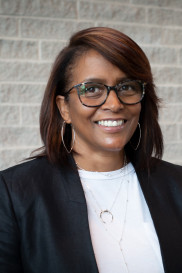
What has the EHE culture been like for you?
I very much appreciate the EHE culture. I like that lately we're doing a lot more connecting points around issues and creating more opportunities to connect across different departments and areas. I appreciate that. With the focus on connecting, our current dean and the college in general, and really engaging us (CETE) more as kind of an equal sibling at the table.
What do you enjoy most about EHE?
I would say the opportunity to combine my passion for racial justice work with my professional role and commitment both within my center and for the college in general. I am happy that we're getting more visibility. We are doing some really innovative and impactful things over here at our little center on the corner. I am proud of us, and I'm happy to just be able to represent us to folks in the college.
Who or what inspires you?
There are so many people that I look up to and that inspired me within the college — activists and family members. I have lots of people who mentor me and don't even realize that they're doing it because I’m watching them, borrowing from them and learning from them.
How do you connect with the mission daily?
I connect to the commitment to racial justice and the outreach and commitment to being a part of advancing community interest. Our center is all about partnering with communities that are addressing real world issues and needs and really leveraging the research and all that the university can bring in support of them. So, we are not trying to tell them what they need to be doing but are asking them to help us understand what their interests and needs are. Then we work to fashion tools, services, support and resources to advance what [the community we are working with at any given time] identifies as the goals that they have and the needs that they have.
How are you growing professionally in your position?
I have been getting lots of professional development, and one of the benefits of COVID was lots of free professional development. Also, I'm leveraging opportunities to engage with others who are doing the kind of work that I want to be doing or doing work the way I want to be doing it. (I) just kind of silently and quietly learn from them as well.
Any hobbies or interests?
I'm a family girl. So, when I'm not at work, I'm doing something with family, for family and about family. I would say my family is what keeps me busy outside of work.
Jacque Fierce, Graduate Student Services Coordinator, Department of Human Sciences
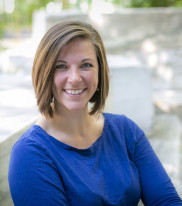
What has the EHE culture been like for you?
I like that a lot of the people that we work with are really student focused. I think that comes naturally with being in a College of Education and Human Ecology where the student experience is really central to the decisions that we're making. And even if they're hard decisions, given the sort of difficult realities that we're living through, people are making those difficult decisions with the student experience in mind. And I think not just the student experience, but also staff and faculty, and what it's like to work here is a consideration for the way that we approach the decisions that we make and the things that we do.
What do you enjoy most about EHE?
This has been one of the best teams I've ever worked with. I think our team is actually one of the best parts about working here. We're really supportive and work together. Our supervisor is easily the best boss I've ever had. She is really helpful and challenges us professionally, but also is flexible and recognizes that life happens. A lot of the times our meetings will start with a check on what's going on in your life. And then we get to the work piece later. I think that type of seeing each other as people first and then employees second is a really important part of how our team functions. When someone needs a little extra help with something or if there's a thing you're working on together as a group, you're more likely to want to help a person out when you genuinely like them as a person. Working together that way is a lot more enjoyable.
Who or what inspires you in the workplace?
Specifically, Sue Sutherland. She somehow manages to do all things but allows people to set appropriate boundaries. I also think this is the first department I've worked in where department leadership, when they are taking time away from work, are very clear about this as time away from work. They’ll say they are spending time with family and here are the people that are in charge. And so, I think leading by example of telling people it's okay to take time off. It's okay to be a person outside of work and bring those interests into the work with you. I think it helps people really recharge when they're away from work, so that when they come back, they can be passionate about what they're doing here.
How do you connect with the mission daily?
I like to think that the mission is reflective of the work that we do and not the other way around. The mission was written as a reflection of the work that we do daily, and what we're doing is creating an inclusive environment where people can learn from each other and learn together. The ways that I can connect with that are by creating a more positive workplace for everyone that works here. Things like the social committee that we started and really trying to help people connect with each other and learn about each other as people. To take that feeling that we have within our team and really broaden it to the rest of the department where people are able to connect and have things in common with those who may not be in their program area. I'm here to support that.
How are you growing professionally in your position?
That is one thing I really enjoy about this position. My direct supervisor really encourages us to pick projects that are meaningful for us and gives us the freedom to make it our own. I've been able to start a number of initiatives that I really feel are important, and I'm empowered to take that on myself. When there are events that are successful or programs that are successful, I am able to really enjoy that success as a product of something that I conceptualized and executed.
Do you have any favorite projects that you’ve been working on?
Two of them are my little pet projects. One of them is our welcome back festival at the beginning of the semester. It's a way to bring together our current students, our incoming students and our faculty and staff across the department. Again, it's a student-focused event where our student organization leaders provide the activities for the event. It's a good way to get to know all of our student organization leaders and connect them with our student body and for a faculty member to be able to mingle in a really relaxed and fun way at the start of the year. The other one is our graduate student ambassadors program that I just started this year. It has been a great way to take the students within our programs that are strong students and good spokespersons for their individual degree area and get them connected with prospective students. The prospective students can read the website. They know what the program information is, but what they want to know is what it feels like to be in this program. So, identifying some of our student leaders and getting them connected with prospective students is a really good way to help them gain some insight into what it's like to be here beyond what is written on the website.
Hobbies or interests you’d like to share?
I'm definitely passionate about travel. I love to go see new places. I really enjoy learning different languages. Throughout the course of my life, I've studied a lot of Spanish, a little bit of French, a fair amount of Italian and a good amount of Russian. So, I really enjoy intercultural experiences and connecting with people from different backgrounds and different places. I have three kids, and so we've started taking them on trips with us. Our favorite location is definitely Puerto Rico. When we're in Ohio, we really like to do all kinds of outdoor things like hiking and long bike rides. So, we really like to spend time outdoors and the beach is my happy place.
Ryan Provost, Educational Studies, Director, Office of Student Services and Graduate Studies
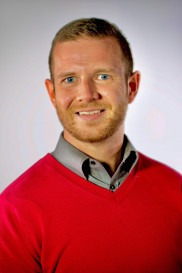
What has the EHE culture been like for you?
I got here three weeks before we all got sent home for the pandemic. But luckily, I've had a lot of great support from within the department. I enjoyed getting to work closely with my direct supervisor Alisa Tate, who has been really supportive. I appreciate being in a department where the leadership is so focused on things that I care about [such as] social justice, inclusion and equity. Even though that work isn't specified in my job role. I know Alisa, Lori (Patton-Davis, chair) and Marc (Guerrero, associate chair) and our department leadership have supported me and encouraged me in looking for ways to highlight the diversity of our students, faculty and staff, and look for ways to celebrate inclusion and build community with minoritized populations within our department. It’s been a great experience for me.
What do you enjoy most about working with the college?
I would say the students, faculty and staff. I feel like the dedication they have to what they're doing invigorates me and gets me excited to do the work that I get to do. People don't come to education because they think it's going to make them rich or get accolades. They come because they care about people, they want to make the world a better place and they believe that education is the pathway to do that. So being in a department and then a college where that was the baseline of the types of people that we're attracting makes my job rewarding. With our students, I get to help connect them to professional development and resources that will help them on their journeys to get their graduate degrees. With our faculty, I get to help them shout out the great research that they're doing. I feel like the people that are attracted to EHE are the kinds of people who may find a job really rewarding and that makes it a unique kind of college experience.
How have you grown since being in your position?
I get to connect with our faculty, staff and our students, even though it was virtual, and learn a lot about how to [do that] when you're not in person with them. That was a big growing and learning opportunity right from the jump. As I've gotten into the role, [which] was sort of new, I got to carve it out and create it [with Alisa] into what was more than I originally imagined for this role. So, I get to do some really cool things. I've always been interested in social media, so I do that for the department and can put some creativity into how I manage that. Managing the communications for our department, thinking about communication strategies and how best to get messages across to different audiences has been a big growth opportunity for me.
The last time I was at OSU, I was working in the First Year Experience Office, specifically helping first- year undergraduate students in their transition to a higher (level). So now, working with master’s and doctoral students, it's a whole different end of the spectrum. It has been cool to get to know the kinds of issues that they're facing, how to best support them, how to best get them set up for success for their own professional and career development in ways that are different than helping a first-year student transition into the university. It's a whole other scenario, working with graduate students, and that's been a lot of fun and really rewarding to get to experience that side of university life.
Any inspirations from your team?
I would definitely say Alisa. We went way back even before I was in this role. She was still an advisor, and I was working for FYE. We knew each other, and I really thought highly of her then. Now that I've gotten to work with her for almost three years, I've grown an even higher level of admiration and respect for her. In the time that I've been in this role, she has been pursuing her EdD in the HESA program. Watching her balance all the responsibilities, all the care she has for us as her staff, all the work she does on behalf of our students and a full class load, has truly blown my mind. How amazing that she has been able to balance all those things. I know it's not easy, and it's inspired me to pursue applying for the EdD and the HESA program too. I hope to start this coming year. I just took my first graduate-level course to get my feet wet this past summer, and I don't think I would have been able to do that without Alisa’s support and encouragement. She's been a tremendous source of support, and then in general for our entire staff and department, she's such a source of positivity. And it's a really uplifting presence to be around.
Do you have any fun hobbies or interests?
One of the things I do almost every week is go to a movie, because I love being able to have that dedicated space and time that is just for me. I'm a big sports fan. I'm from the Atlanta area, so I’m always rooting for any Atlanta or Georgia sports. And of course, I am always rooting for the Buckeyes. I have a dog, and I love spending time with him. I've had him for 11 years now, so growing with him and having him in my life has been a steadying, calming force that brings me a lot of joy.
Michelle Chambers Robison, Faculty Affairs
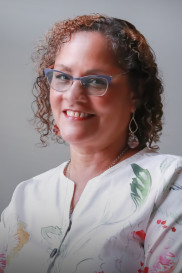
What has the EHE culture been like for you?
Well, I like my office because I really like my co-worker, who is my supervisor. There's only two of us, so it's a small office. We work on specific projects that I like, and I’ve learned a lot because I've been doing them for a few years. I like the staff that I work with — the staff that’s in administration, and the staff that are leaders in the department, the executive assistants and those kinds of people. I enjoy working with them.
What have you enjoyed most about working with the college?
That we really try to do the right thing with diversity and including all types of people. I think there's a lot of “talk the talk” but not “walk the walk,” and I think that our dean really tries to model this [walk the talk].
What inspires you at work?
I am inspired by people who like their jobs and do a good job. I’m inspired by people who communicate with others well and consider them when you're talking to them. They don't just spout things and don't care how it turns out. I appreciate people who make an effort to be kind.
How do you connect with the mission daily?
Touching on excellence, people that do a good job, respectful in their job and to other people and do the very best that they can. I like working with those types of people. Sometimes I have found when you have a good work ethic, that it pours over on people, and they will try to do better because they have worked with you. I do like that we have a leadership right now that has anything to do with our associate our dean or associate dean's our leadership, the leadership committee. I liked that they are working together, they stay in touch, and they try to stay on the same page.
How are you growing professionally in your position?
There is always so much going on, so many changes and so many improvements. I try to stay on top of it and add something positive to it, and if I can, I watch and learn.
What are your hobbies and interests?
I love to read. I read a lot of novels. I love movies, cooking and getting together with friends and family. I love being with my grandkids too. They live in California so I have to do the best I can to see them as often as I can.